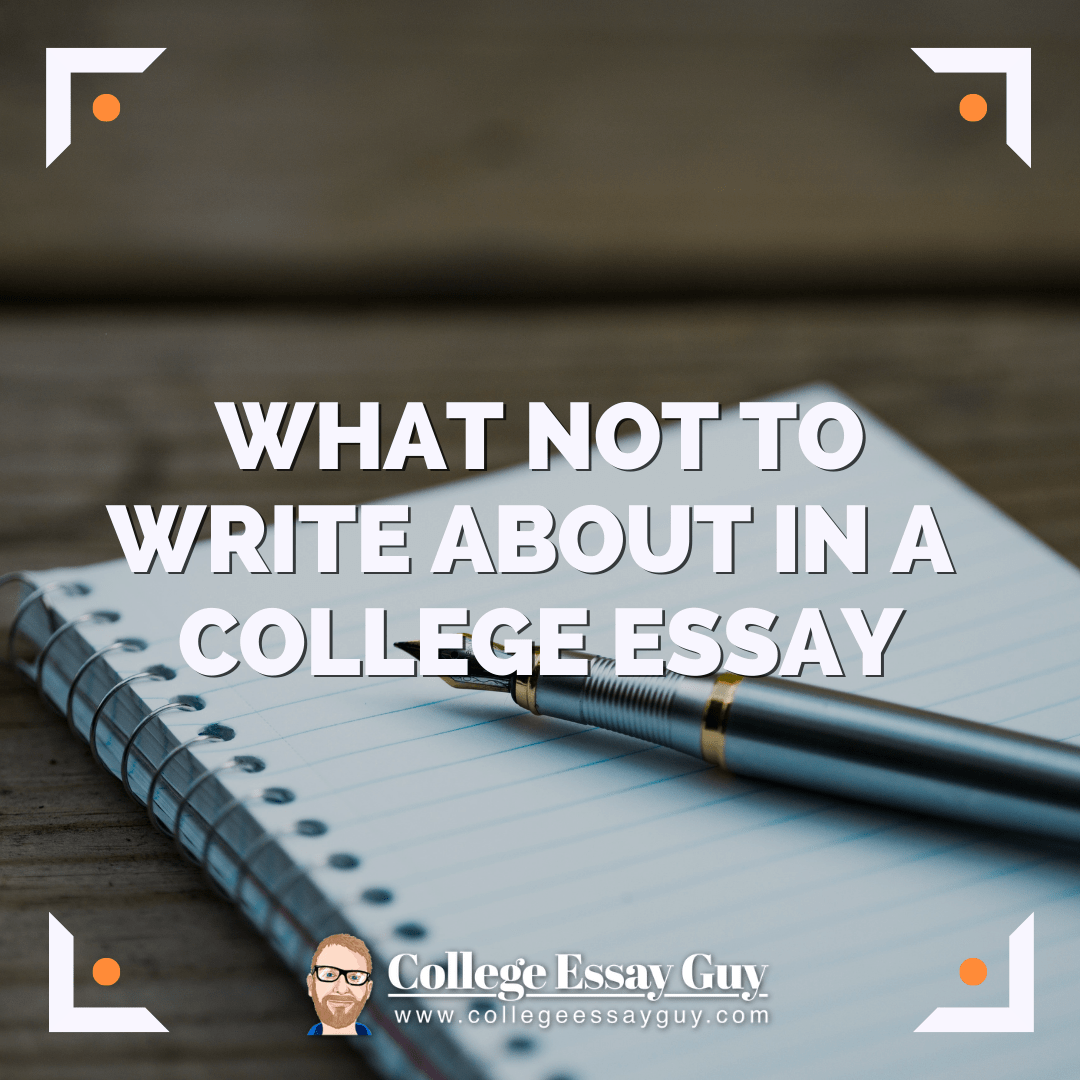Once you get into college, essay writing becomes a way of life. It’s only fitting, then, that getting into your dream college often involves writing one or more college essays as part of your application process. However, many students struggle with one big question: “what should I write my college essay about?”
To maximize your chances of getting accepted, you need to know how to write college essay topics that stand out. And, just as importantly, you need to understand things to avoid in college essays!
If you’re worried about questions like “how should I write my college essay,” don’t worry: we’ve got you covered. Keep reading to discover the best college essay ideas as well as a definitive roundup of things to be wary of.
What do colleges look for in essays?
Overall, colleges are generally trying to get a sense of who you are through your college essays in your perspective, values, and voice. But here’s the paradox of the college essay: the prompts are often intentionally generic. For example, a prompt might ask you to describe a time you overcame a challenge. This makes most students think the admissions committee is interested in the challenge itself. However, what the committee really cares about is who you are, and the prompts are designed to let them know more about you in a dynamic way.
So there are plenty of ways you could answer the prompt, but you need to make sure your responses help to illustrate some of the positive traits a committee might be looking for. For example, an in-depth explanation of a time you solved a complex dilemma can showcase your potential as a scholar and researcher. And an essay about you volunteering in your community shows the admissions committee that you are a leader who is focused on making the world a better place.
Beyond making yourself look good, the primary goal of any college essay is to help you stand out from other applicants. This gives you a chance to really lean into a certain writing style (for example, it’s okay to use a humorous writing voice) that makes your essay more memorable. In fact, it actually helps to humanize you, meaning the admissions committee will see yours as more than just another application in the stack.
And because your goal is to stand out and show who you are, some topics are better than others when it comes to writing a great essay. So let’s take a closer look at some of the common college essay topics you should probably avoid.
Cliche College Essay Topics to Avoid
Below, we’ll break down some of the most cliche essay topics. For each one, we’ll get more into how and why it’s a bad topic (by “bad” we mean it’s really hard to write it well). And if you’re absolutely determined to go with one of these college essay topics to avoid, we’ve got info near the end on how you can make the essay as strong as possible.
Resume/academic achievements
What’s the biggest mistake you can make when writing a college essay? Simple: accidentally thinking that you’re applying for a job instead!
Many students asking “what do colleges look for in essays” decide that the best approach is to list out different kinds of achievements. These may be academic achievements or achievements related to various extracurricular activities (such as sports trophies).
What’s the problem with focusing on your accomplishments like this? The biggest is that it misses the point of the essay—we don’t really get a sense of who you are through these things. Since you have so few words to work with, a long list of accomplishments is going to feel cramped. Plus, there won’t be much room to contextualize the achievements or to humanize yourself. And you have other space for these kinds of things—use the Activities List and Additional Info sections. At the end of the day, you are far better off crafting your essay around a single awesome experience than you are turning the entire essay into a resume.
The mission trip essay
Religious students are often tempted to submit college essays focused around a mission trip they went ont. On paper, this seems like a good idea: it showcases leadership, community service, and the student’s general willingness to help other people. However, submitting the mission trip essay tends to be a bad idea for several different reasons. (The fact that it has a name, “The mission trip essay”, is a sign.)
First, this is one of the most common college essay topics that admissions committees receive. Some committee members may be annoyed at seeing “yet another one” in their stack of essays. And even if the committee is fine with a mission trip essay, so many people write them that it’s going to be hard to not sound like hundreds of other applicants.
Second, there is a real danger in how you describe the communities that you helped. If you’re not careful, you may use the language of exclusion or xenophobia. Instead of making yourself look good, this could make you look judgmental or even bigoted.
Third, and finally, mission trips are all about helping other people (Which is great! Definitely help other people!). But when you write an essay trying to make yourself look good for helping people, you may end up seeming overly self-congratulatory, which defeats the purpose of writing the essay in the first place.
Sports challenge essays
If you’re an athlete, writing a college essay about a sports challenge you faced may seem like a no-brainer. “Sports challenges” include essays about winning the big game, losing the big game, making (or not making) the team, and even getting a nasty sports injury. However interesting the sports challenge itself was, though, these typically make for bad college essays topics. (Again, meaning they’re tough to write well in ways that stand out.)
Why is that? Like the mission trip essay, a sports challenge college essay is very common. Since one of the main goals of the essay is to help you stand out, it doesn’t really help to do the same thing that countless other people are doing. For example, almost everyone writing about losing the big game ends up writing the same “lessons learned” about humility, teamwork, overcoming disappointment, etc.
And another big reason to avoid the sports challenge college essay is that you have to use so many words to explain the context of the big game, what the major plays were, the ultimate outcome, and so on. This doesn’t leave much room for personal reflection or even stylistic writing, so you are left with an admission essay that mostly codes you as “generic athlete” in the eyes of the committee.
The Big Performance
A close cousin to “the big game” style of college essay is “the big performance.” These are essays that focus on someone getting ready to take center stage in a play, perform a captivating musical solo, give a major speech, and so on.
As with sports challenge essays, these essays are very common, and tend to have very similar plot points, so it’s tough to make your own stand out. For example, the big performance always goes well or goes poorly. Performers almost always learn either the value of preparation or the inner strength to overcome a major disappointment. With these kinds of essays, you may be unable to do what you did with an actual big performance: stand out in a big way.
Another thing these essays have in common with sports essays is that you will inevitably spend much of your essay word count describing what the performance is, how you actually performed, what made the performance great (or not so great), and so on. This gives you less room to humanize yourself and emphasize how and why the skills you used to face this challenge make you an ideal college student.
Cliche immigration story
Sometimes, what makes a topic a bad college essay is that it doesn’t really do anything new. And that’s the case when it comes to the cliche immigration essay.
We say “cliche” because the vast majority of college essays focusing on immigration emphasize the same things: moving to a new home, feeling out of place, and eventually learning to accept both one’s cultural heritage and one’s new surroundings. There are more of these college essays than there are Lifetime movies about falling in love with a handsome stranger.
Does this mean there’s no way to write a good immigration-focused college essay? Of course not! But try to pick a more unique story related to your immigration experience. Not only will this help your application stand out, but a more unique topic can also help to humanize you as you describe the unexpected situations that you had to ultimately overcome.
Why X person is your hero
Sometimes, it’s tempting to write about someone who is your personal hero. After all, these are the kinds of people who have influenced the trajectory of your life in a major way, and it’s easier to write passionately about the people who have inspired your own passions.
However, there is one chief reason you should be wary of writing about your personal heroes: if you’re not careful, the essay ends up being more about the other person than yourself, which can lead to a reader feeling like “Your grandma sounds awesome. Too bad she’s not applying to college.”!
The tough grade you got
Many college essay prompts ask you to write about a time that you overcame a major challenge. There are many challenges students could potentially write about, and many choose to write about what they did after they received a bad grade.
It’s generally never a good idea to use this as an essay topic, though.
First, other students will write about some serious challenges, even things like escaping war. Framing getting a bad grade as a serious challenge next to something like that … may not go so well.
And while everyone has gotten a bad grade from time to time, you don’t want to make poor academic performance the first thing an admissions committee hears about you.
Try to focus on a topic that emphasizes your strengths more than your weaknesses.
And if you feel like you don’t have many challenges to write about, check out this guide on how to write well about a challenge that wasn’t really a big deal.
Your first heartbreak
There is nothing quite like the rush of young love … and nothing quite as painful as a young breakup. And due to the raw intensity of the emotions involved, many would-be college students focus on their first heartbreak as their college essay topic.
But this is generally a bad idea for several reasons. First, to be blunt, epic teen romance is usually far less important to those outside the relationship. It’s a bit of an uphill climb to even get the admissions committee to see this as an important topic.
Second, as with writing about your heroes, writing about a heartbreak means you’ll spend plenty of time writing about the other person. And the more you talk about your ex, the less room you have to talk about yourself.
Third, many people have multiple relationships over the course of their college education. If you spend hundreds of words talking about how much a single breakup nearly disrupted your life, it may make the committee worry about how easily you could get distracted by romance and start losing focus on your actual studies.
Illegal/unethical activities
In a perfect world, this would go without saying, but here goes: whatever you do, make sure your college essay doesn’t talk about you participating in illegal or unethical activities. For example, if you casually mention illegal drug use in your essay, it will make the college worry about you partaking in illegal drugs while at the college. They may even worry about you getting others (such as frat brothers or sorority sisters) using illegal drugs as well. Not a great look.
And even when it’s not an outright crime, you should refrain from writing about unethical activities that make you look bad. For example, some students have actually written college essays about how they were caught cheating on a test and ultimately learned from the experience. Learning from mistakes is fine and all, but the only outcome of such an essay is making the admissions committee question how long it will take you to start cheating on various college tests and essays.
The ideal essay topic is one that makes the committee trust you and believe that you’ll add value to the college. That’s going to be tough to do when you write about illegal or unethical activities.
If you really, really want to try to make a cliche topic work
So far, we have focused on very specific essay topics you should steer clear of. However, there are many students who gain admission to their dream colleges every year by using these topics. What’s their secret? Simply put, they have found a way to make cliche topics feel a bit less cliche.
For example, if you decide to do a “resume” style essay, don’t try to dazzle them with all of your different accomplishments. Instead, zero in on one very specific accomplishment, and dive into layers of reflection and meaning. This gives you much more room to detail how the experience shaped you into the kind of person who will add real value to the college. The same wisdom holds true for writing about your mission trip: if you must write about it, try to focus on values that we’re not expecting. Like, did it teach you about healthy boundaries and autonomy and balance, instead of the cliche version. .
Same thing applies if you must write about overcoming a sports challenge: try to avoid common topics such as, grit, resilience, determination (which are basically all the same thing), learning to trust teammates, how you were thrilled at winning the big game, or how heartbroken you were to lose. Instead, try more unconventional topics like how a sports injury forced you to learn new skills or how it helped you discover a new passion. One of the best we’ve seen was how playing cornerback helped a student read Dostoevsky better. In addition to being more unique, such a topic shows you are adaptable.
If you decide to write about a big performance, it helps if the performance itself is unusual. No matter the performance, though, try not to spend too much time describing that performance. Instead, you should use the outcome of the performance as a springboard to discuss the new skills and life lessons you have learned. Ultimately, it will be what you know now that gets you into the college of your choice rather than how you performed then.
As we detailed before, an issue with most immigration college essays is that they focus on worn topics such as adjusting to a new place, learning new languages and cultures, and so on. If you’re going to write this essay, you’ll be better off focusing on something like a single specific moment (like what you did the first time you encountered racism or xenophobia) or a much less conventional challenge you faced (for example, asking someone out on a date when you are still struggling with a new language).
When writing college essays about your personal hero, be sure to actually focus more on yourself than on them. Help us see what you learned from them, how you’ve applied those lessons, and how they’ve shaped you into the thinker and scholar you are today.
Finally, we generally recommend against trying any variation of the “bad grade” essay—it’s crazy hard to make work. You should similarly avoid writing about your first heartbreak because it is nearly impossible to write a brief essay about young love gone wrong the committee hasn’t seen a thousand times before.
And at all costs, avoid writing about illegal or unethical activities unless you want your application sent to the “circular file” (the nearest trashcan).
Start writing your college essay today
Now you know what to do when it comes to college essays. And, perhaps more importantly, you know what not to do. Now comes the hard part, though: sitting down and doing it!
Fortunately, this is not a challenge you have to tackle on your own. We offer a full set of resources to help you craft a great essay and get help with other college admission questions. We’re here to help you do one very important thing: to turn the college of your dreams into reality for the next school year.
Special thanks to Chris Snellgrove for writing this blog post.
Chris Snellgrove is an English Professor at Northwest Florida State College who specializes in literature, rhetoric, and business writing. As a freelance writer, Chris specializes in sales, marketing, pop culture, and video games. He has a B.A. in English from Troy University and both an M.A. and Ph.D. in English from Auburn University. When he’s not writing or talking to others about writing, Chris loves reading books, playing video games, watching horror movies, and disappearing into a comic book. He currently lives in Northwest Florida and would probably rather be at the beach right now.
Top values: Diversity / Equality / Social Justice










